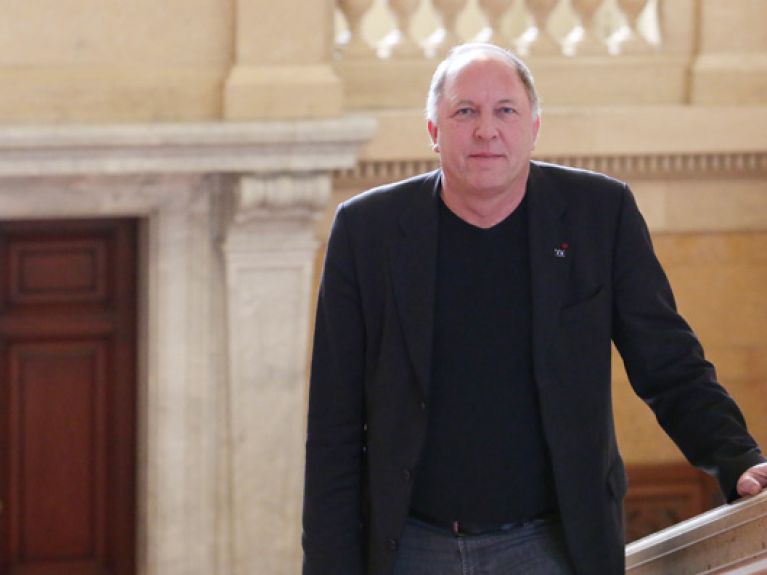Ulrich Fuchs, Vice-Director of the European Cultural Capital of Marseille, interviewed by DE
The German cultural management expert discusses culture as a development driver for European Cultural Capital of Marseille.

Mr. Fuchs, Marseille, European Capital of Culture, has had a reputation as a stronghold of violence, drug dealing and gang warfare. Can a cultural programme sustainably alter the image of a big city?
A city’s bad reputation is an ideal prerequisite for it becoming a Capital of Culture. The title awarded by the European Union is not conceived as a prize to crown a prince, but as a kind of grant for turning a frog into a prince. Other cultural capitals to date have had a similarly difficult point of departure. The designation is about altering realities and mentalities, using culture to drive development. The people of Glasgow say that without the title, granted 13 years ago, it would never have come out of crisis so fast. And the mayor of Lille claims that thanks to being the Capital of Culture that city gained ten years in terms of urban development. That is also the hope behind “Marseille-Provence 2013”.
Marseille is not just an important European gateway to the Mediterranean, it is also a migration hot spot …
This has a lot to do our continent’s wealth. Geographically, Marseille is closer to Algiers than to Paris, which accounts for the city’s particular character, and was one of the reasons for giving the title to the Marseille-Provence region. And the “Méditerranée” theme is well represented in the “MP 2013” programme and in the new museum buildings. We are working with cultural institutions and artists from Algeria, Morocco, Tunisia, Egypt, Israel and Palestine. These represent a strong axis in the programme’s 900 projects.
The French have chosen a German Deputy Managing Director for their Cultural Capital. Franco-German friendship is now 50 years old. Is that also reflected in the programme?
I’m proud of the fact that there are numerous events related to the altogether ambivalent theme of Franco-German history. Sometimes history’s chance elements can be a bit crazy: 22 January 2013 was the 50th anniversary of the Elysée Agreement; and 23 January was the 70 anniversary of the National Socialists’ destruction of Marseille’s oldest district, the Panier, whose inhabitants were put into internment camps. Many Germans don’t know this, nor do many French people. The theme is addressed in the series “Mémoires–Exile”. One project particularly close to my heart is the commemoration tour “Ici Même”, about the history of the city of Marseille during the Second World War. It is reminiscent of the Stolpersteine in Germany, the brass “stumbling blocks” embedded in pavements to recall the many Jewish inhabitants murdered by the Nazis. There will also be events throughout the year, such as exhibitions on the German occupation or on the résistance. Once the new MuCEM, the Museum of Civilizations from Europe and the Mediterranean, is open, there will be a two-day event there in June called Marseille Transit, which will feature Transit, the film by René Allio, readings from Anna Seghers’ novel of the same name, and pictures from the 1940s, when the city was a hub and a place of refuge for refugees from the countries occupied by the National Socialists.
Events will also be held in the former French internment camp Les Milles near Aix-en-Provence.
Yes, that’s a very important commemoration and discussion venue, opened in September 2012 as a memorial site. Many Jewish immigrants and persecuted intellectuals like Lion Feuchtwanger and Alfred Kantorowicz were interned in that former brickworks at the behest of the Vichy government. Later it became a collection camp for deportees. The memorial argues that that should never happen again. Our projects also include an exhibition of works by artists once interned there, including Max Ernst, Hans Bellmer, Wols and Anton Räderscheidt.
How is this Franco-German view of the past being received?
Very positively. The responsibility which I have personally assumed for many of the projects is being honoured with great respect and eager involvement by the people of Marseille, including politicians. Old resistance fighters have expressly thanked me for it. However, for me as a German born after the war, it was self-evident that this period in our history should not be ignored.
You also organized many of the projects with the Goethe Institute?
Fortunately, the fact that Marseille became the Capital of Culture resulted in the Goethe Institute reviving its Marseille branch, closed in 1997, and taking part in “MP 2013” with a number of successful events. Credit for this goes to the very active Goethe Institute director in Paris, Joachim Umlauf.
What will remain after this grand show of cultural fireworks?
If our budget succeeds in keeping new cultural institutions like the MuCEM, the first national museum outside Paris, functioning after 2013, a lot will have been achieved. After all, 680 million euros have been invested in the cultural infrastructure and urban planning projects, which indicates the incredible effort made by Marseille along with the state, the region and the département. Just think of the urban planning project “Euro-Méditerannée”, the largest of its kind currently in Europe involving the restructuring of a whole city district. The second point would be that the city continue to open up to the international scene. Lille organizes a biennial with the support of local industry, so in future Marseille could regularly mount an international event to recall “Marseille-Provence 2013” and further pursue the theme of the Mediterranean. ▪

